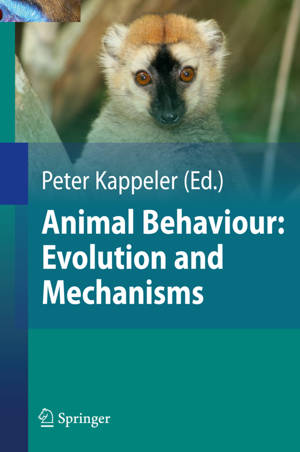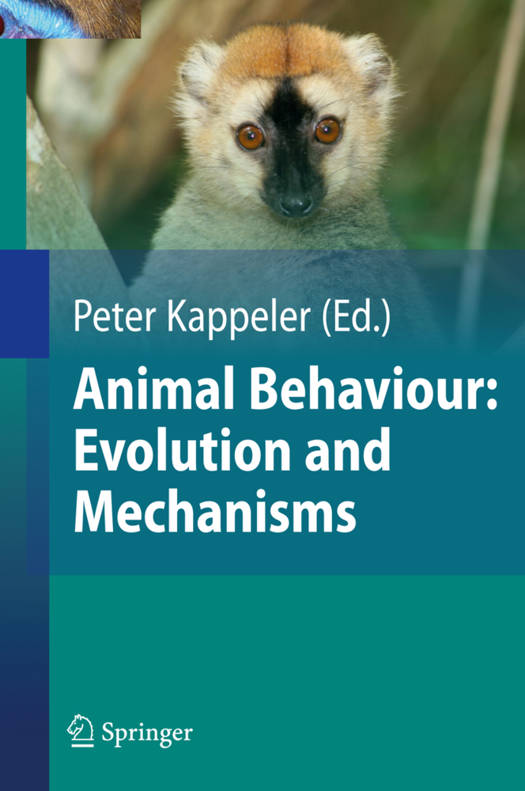
- Afhalen na 1 uur in een winkel met voorraad
- Gratis thuislevering in België vanaf € 30
- Ruim aanbod met 7 miljoen producten
- Afhalen na 1 uur in een winkel met voorraad
- Gratis thuislevering in België vanaf € 30
- Ruim aanbod met 7 miljoen producten
Zoeken
Animal Behaviour: Evolution and Mechanisms
Nils Anthes, Ralph Bergmüller, Wolf Blanckenhorn, H Jane Brockmann, Claudia Fichtel, Lutz Fromhage, Joachim Frommen, Wolfgang Goymann, Juergen Heinze, Katharina Hirschenhauser, Heribert Hofer, Sylvia Kaiser, Peter M Kappeler, Bart Kempenaers, Gerald Kerth, Judith Ingrid Korb, Kurt M Kotrschal, Cornelila Kraus, Martha Manser, Nico Michiels, Robin F A Moritz, Mario Pahl, Dustin Penn, Norbert Sachser, Martin Schaefer, Carel P Van Schaik, Jutta M Schneider, Isabella Schreiber, Michael Taborsky, Jürgen Tautz, Fritz Trillmich, Shaowu Zhang
Hardcover | Engels
€ 89,95
+ 179 punten
Uitvoering
Omschrijving
The study of animal behaviour has become one of the fastest growing b- logical disciplines in recent decades. This development can be easily - ferred, for example, from the steady increase in the total number of pub- cations on any aspect of animal behaviour, in particular also in journals with a more general readership (e. g. Nature, Proceedings of the Royal - ciety or Current Biology), the ever-increasing number of participants at - ternational conferences (e. g. IEC or ISBE), and from the growing numbers of students choosing courses in this field. This development has several causes, of which I find three particularly compelling. First, it is incre- ingly being appreciated that behaviour is the crucial level at which an in- vidual s genotype and phenotype interface with the environment. Rec- nising behaviour as the main mechanism animals employ to ascertain their homeostasis, growth, survival and reproduction therefore provides a deep understanding of organismal integration and adaptation. Second, the ast- ishing success of the study of animal behaviour also has importantly to do with the intellectual flexibility and methodological inter-disciplinarity - quired for comprehensive analyses of behaviour. Today, students of beh- iour are jacks-of-all-trades; importing, applying and improving methods from many neighbouring disciplines, such as molecular genetics, physi- ogy or micro-electronics, as well as concepts and theories from less ob- ous sources, such as economics or sociology, for example."
Specificaties
Betrokkenen
- Auteur(s):
Nils AnthesRalph BergmüllerWolf BlanckenhornH Jane BrockmannClaudia FichtelLutz FromhageJoachim FrommenWolfgang GoymannJuergen HeinzeKatharina HirschenhauserHeribert HoferSylvia KaiserPeter M KappelerBart KempenaersGerald KerthJudith Ingrid KorbKurt M KotrschalCornelila KrausMartha ManserNico MichielsRobin F A MoritzMario PahlDustin PennNorbert SachserMartin SchaeferCarel P Van SchaikJutta M SchneiderIsabella SchreiberMichael TaborskyJürgen TautzFritz TrillmichShaowu Zhang
- Uitgeverij:
Inhoud
- Aantal bladzijden:
- 707
- Taal:
- Engels
Eigenschappen
- Productcode (EAN):
- 9783642026232
- Verschijningsdatum:
- 29/03/2010
- Uitvoering:
- Hardcover
- Formaat:
- Genaaid
- Afmetingen:
- 155 mm x 236 mm
- Gewicht:
- 1360 g

Alleen bij Standaard Boekhandel
+ 179 punten op je klantenkaart van Standaard Boekhandel
Beoordelingen
We publiceren alleen reviews die voldoen aan de voorwaarden voor reviews. Bekijk onze voorwaarden voor reviews.











